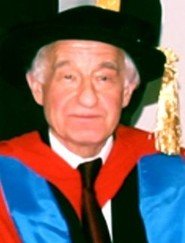
Born in 1935 in Alloa, in the Scottish heartland, David Clive Wilson is the son of the Rev William Skinner Wilson and his wife, Enid. He attended Trinity College Glenalmond, and won a scholarship to Keble College, Oxford. After graduating from Oxford, he joined the British Foreign and Commonwealth Office in 1958. In his long foreign service career, David Wilson would become closely involved with Hong Kong and China, and in decisions that would affect the lives of millions of Chinese people.
From 1960 to 1962, David Wilson was posted to Hong Kong as Political Advisor to the Governor. This would be the first of his many sojourns in Hong Kong. During these two years, he studied Chinese at our University. He continued his foreign service for the British government and his Chinese language training in Beijing in 1963 to 1965. At the end of five years, David Wilson gained a sound knowledge of the language, and first-hand experience of working with the Chinese as a government and people.
This professional contact with the Chinese took a scholarly turn in 1968 when David Wilson became the Editor of the very prestigious journal, The China Quarterly. As Editor, his aim, as he stated in his first editorial, was to ensure that the journal "serve the needs of all those with a serious interest in China both within and outside the academic world". The general and academic readers are two very different creatures, and it is not an easy balancing act to engage with both of them, especially since many of these readers are already themselves China specialists. It is a balancing act which requires both critical and rhetorical judgment, a judgment which David Wilson exercised consistently and to considerable acclaim during the years of his editorship.
His task as Editor is further complicated, and also dignified by his commitment to the policy of drawing contributions "from all shades of opinion on development in China and from all parts of the world". David Wilson's intellectual acumen and judgment are leavened by the spirit of openness, and a readiness to consider all views that contribute to the understanding of China and between the world and China. These qualities which distinguish him as an Editor are also the hallmarks of his later diplomatic career. Not every diplomat is a scholar and certainly not all academics are diplomatic, but David Wilson’s combination of these careers places him in an honourable tradition in both European and Chinese culture, his political work and scholarly knowledge informing and enriching each other.
To consolidate further his already substantial preparation for the China Desk, David Wilson did research for a thesis at the University of London on relations between Great Britain and the Kuomintang in the 1920s for which he was awarded a doctoral degree in 1973. He rejoined the British diplomatic service in 1974, and from 1977 to 1981, he was again in Hong Kong as Political Advisor.
His involvement with Hong Kong further deepened as he acted as senior representative for Britain in the Sino-British Joint Liaison Group charged with negotiating the arrangements for 1997. In January, 1987, he was made Knight Commander of the Order of St Michael and St George, and in April of that year, he returned for his third extended sojourn in Hong Kong as Governor and Commander in Chief. It is as Sir David Wilson, the twenty-seventh and penultimate governor, that he is well-remembered by the citizens of Hong Kong.
David Wilson's governorship witnessed one of the most challenging periods in Hong Kong's recent history. The ongoing negotiations over the return of Hong Kong to Chinese sovereignty in 1997 were the main platform where the governor would exercise his well-honed diplomatic skills in the interest of fostering understanding between China, Britain, and Hong Kong. His openness, critical judgment, and ability to balance different views and interests were put to severe test as Hong Kong suffered first from the economic fallout of the stock market crash in October 1987, and the pain and distress over what happened in Tiananmen Square in June 1989.
The decisions he made during these years were not always popular, but they were made in the light of what he considered would serve the best interests of Hong Kong – how to restore public morale, maintain public confidence in good government, and ensure continued prosperity and stability. His steadiness, sobriety, and personal rectitude are still talked of with appreciation in many Hong Kong circles and by men and women in the streets today.
In January 1991, David Wilson was made Knight Grand Cross of St Michael and St George, taking the title of Lord Wilson of Tillyorn. After leaving Hong Kong, Lord Wilson continues to promote academic and cultural exchanges between the territory and Britain in his capacity as Chancellor of the University of Aberdeen, and Master of Peterhouse College, Cambridge. As Chairman of the power company Scottish and Southern Energy, Lord Tillyorn had been able to combine his life-long interests in hill-walking and public service. He had followed the treks to remote communities in the Scottish highlands and islands, to talk to the people who live there about their energy needs, and to listen, with his customary patience, to their views and suggestions.
David Wilson's name is inscribed in the landscape of Hong Kong. The seventy-eight-km Wilson trail offers Hong Kong citizens, as their remembrance of Lord Wilson does, routes into an alternative world - a world where they can step back and reflect upon the changing contours of time and place with an equanimity of spirit, and in the freshness and open light of day.
Mr Chancellor, for his contributions as scholar and to the community of Hong Kong, it is my honour and privilege to present David Clive Wilson for the award of the Degree of Doctor of Letters honoris causa.
Citation written and delivered by Dr Elaine Ho Yee Lin, the Public Orator.




